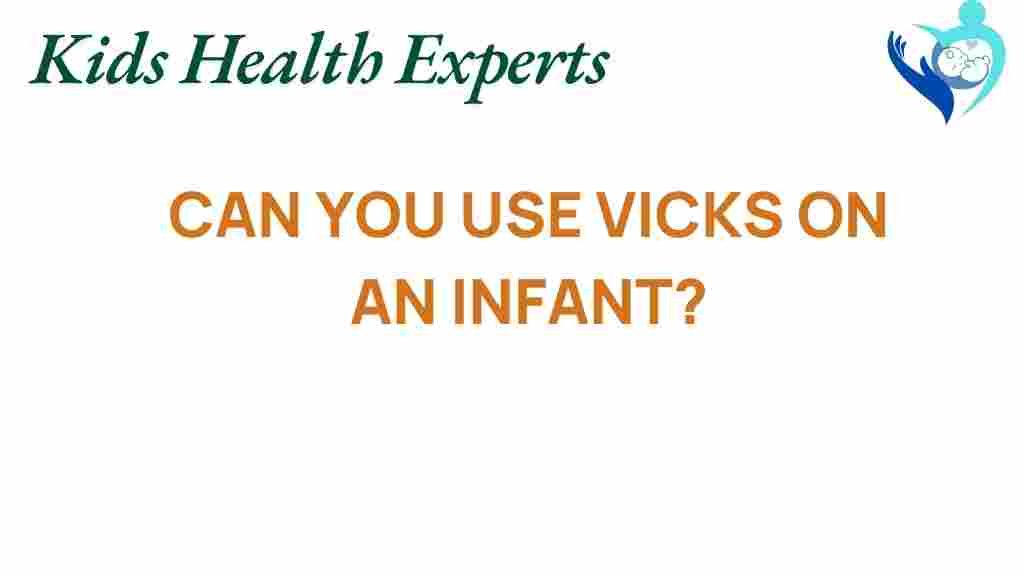The Surprising Truth: Can You Use Vicks on Infants Safely?
As a parent, caring for your infant’s health is paramount. When your little one is struggling with congestion or a cold, you might be tempted to reach for products like Vicks VapoRub. However, the safety of using Vicks on infants has been a topic of considerable debate among parents and pediatricians. In this article, we will explore the use of Vicks for infants, focusing on safety, effective remedies, and essential precautions parents should take.
Understanding Vicks and Its Ingredients
Vicks VapoRub is a topical ointment that has been a go-to remedy for generations. It contains a blend of ingredients such as menthol, camphor, and eucalyptus oil, which are known for their soothing effects on the respiratory system. When applied to the skin, Vicks creates a cooling sensation that can help alleviate cough and congestion symptoms. However, the question remains: is it safe for infants?
Safety Concerns for Infants
When considering the use of Vicks on infants, safety is the primary concern. Here are some key points that parents should consider:
- Age Restrictions: Vicks VapoRub is generally not recommended for children under the age of 2. The strong menthol and camphor can be too intense for an infant’s sensitive skin and respiratory system.
- Skin Sensitivity: Infants have delicate skin that can easily react to topical treatments. Applying Vicks could lead to irritation or an allergic reaction.
- Inhalation Risks: Infants are more susceptible to respiratory issues. The vapors from Vicks can sometimes cause more harm than good, leading to breathing difficulties.
Consulting a Pediatrician
Before using any over-the-counter remedy like Vicks on your infant, it’s crucial to consult your pediatrician. They can provide personalized advice based on your child’s specific health needs. If your child is experiencing severe congestion or persistent coughing, your pediatrician may recommend alternative treatments or remedies that are safer for infants.
Alternative Remedies for Congestion in Infants
While Vicks may not be suitable for infants, there are several safe and effective remedies to help alleviate congestion:
- Saline Nasal Drops: These drops help to moisten and clear nasal passages. They are safe for infants and can be used before feeding or sleeping.
- Humidifier: Using a cool-mist humidifier in your child’s room can keep the air moist, which may ease congestion and help them breathe better.
- Steam Baths: Sitting in a bathroom filled with steam can help loosen mucus. Ensure the water is not too hot and that the infant is supervised at all times.
- Gentle Suction: Using a bulb syringe, you can gently suction mucus from your infant’s nose to help them breathe more easily.
Step-by-Step Process: How to Safely Alleviate Congestion
If your infant is congested, here’s a step-by-step guide to safely alleviate their symptoms:
- Consult Your Pediatrician: Always start by discussing your infant’s symptoms with their doctor to rule out any serious issues.
- Use Saline Drops: Administer saline nasal drops as recommended. This will help to loosen mucus.
- Use a Humidifier: Place a cool-mist humidifier in the nursery to maintain moisture in the air.
- Steam Treatment: Run a hot shower to create steam, then sit with your infant in the bathroom (but not in the hot water) to help clear their nasal passages.
- Gentle Suction: If necessary, use a bulb syringe to gently remove excess mucus from your infant’s nose.
What to Avoid When Treating Infant Congestion
While treating your infant’s congestion, it’s important to avoid certain practices:
- Do Not Use Vicks: As previously mentioned, avoid using Vicks VapoRub on infants under 2 years old.
- Avoid Over-the-Counter Medications: Never give infants cough and cold medications without consulting a pediatrician, as they can be harmful.
- Steer Clear of Essential Oils: Many essential oils can be too strong for infants and may cause respiratory distress.
When to Seek Medical Attention
It’s essential for parents to know when to seek medical help. If your infant exhibits any of the following symptoms, contact your pediatrician immediately:
- Difficulty breathing or wheezing
- High fever (over 100.4°F or 38°C)
- Persistent cough that lasts more than a few days
- Signs of dehydration (e.g., dry mouth, no tears when crying, or fewer wet diapers)
- Unusual irritability or lethargy
Conclusion
In summary, while Vicks can be a helpful remedy for adults and older children, its use on infants is not recommended due to safety concerns. Parents should exercise caution and prioritize their infant’s health by consulting a pediatrician before trying any remedies. Fortunately, there are plenty of safe alternatives to help alleviate your infant’s congestion, including saline drops, humidifiers, and gentle suction techniques. Always be vigilant and proactive about your child’s health, and do not hesitate to seek medical advice when needed.
For more information on caring for your infant and safe remedies, visit this informative resource. Also, don’t forget to check out this article on infant health for additional insights.
This article is in the category Care and created by KidsHealthExperts Team
